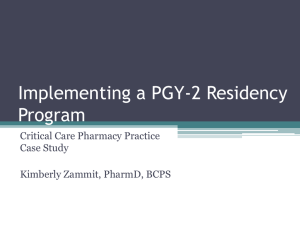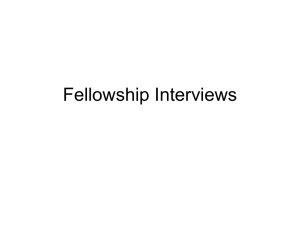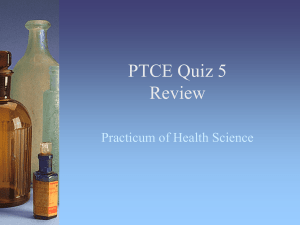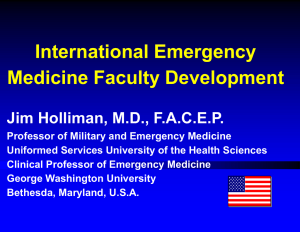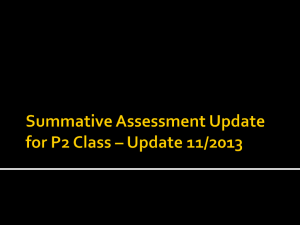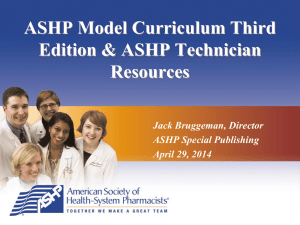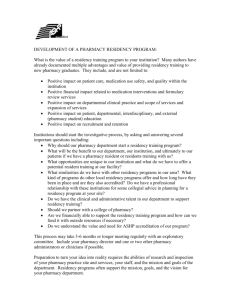I*m ready to apply for a residency*what do I do now?
advertisement
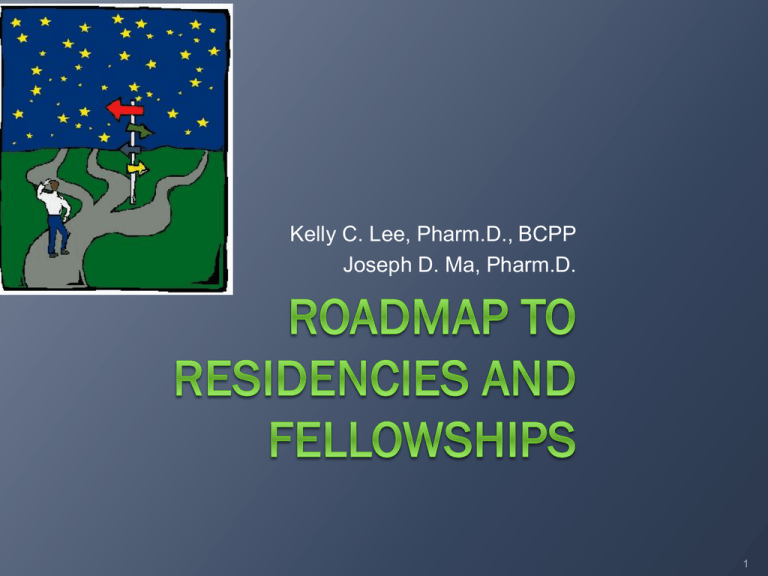
Kelly C. Lee, Pharm.D., BCPP Joseph D. Ma, Pharm.D. 1 Outline Residencies Fellowships Where to find programs How to select a program Barriers/obstacles Timeline Question and Answer Session 2 PGY1 Residency Purpose Train to become clinical pharmacist Rotations (usually 4-6 weeks) in various areas of pharmacy practice Usually 12 months in duration Pros Good programs train you to become excellent clinical pharmacists Gives individual a great overview of the possibilities in pharmacy practice Cons Can be a repetition of P4 year Poor training/mentoring Primarily used as staff pharmacist Experiences Acute care, ambulatory care, administrative, residency project 4 PGY2 Residency Purpose Train to become a clinical pharmacist in a particular area of specialty Usually 12 months in duration Pros Excellent opportunity if you know what specialty you are interested in Provide mentoring/training for career path Cons Specialty needs to be marketable and desirable Specialty cannot be too narrow May not get experience in all areas of pharmacy practice Inexperienced preceptors Experiences Acute care, ambulatory care, health system management, residency project 5 Types of PGY2 Programs Ambulatory Care Cardiology Critical Care Drug Information Geriatric Pharmacy Health-System Pharmacy Administration Infectious Diseases Internal Medicine Nuclear Medicine Nutrition Support Oncology Pain Management and Palliative Care Pediatric Pharmacy Pharmacotherapy Informatics Psychiatric Pharmacy Pharmacy Residency Training in an Advanced Area of Practice Solid Organ Transplant Pharmacy Medication-Use Safety 6 Accredited vs. Non-Accredited Accrediting Organizations ASHP accredited residency ACCP peer reviewed fellowship ○ Voluntary peer review process conducted by the ACCP Fellowship Review Committee APhA joint accreditation for Community Pharmacy AMCP joint accreditation for Managed Care Pharmacy Pros of Non-Accredited Programs: Flexible, tailor to your wants/needs Cons of Non-Accredited Programs: No standard guidelines, may not obtain adequate components of most residencies Accreditation fairly important for PGY1, PGY2 and fellowships may not be as critical 7 In-State vs Out-of-State Programs Pros Great way to experience pharmacy (and life) in different region of the country (for 1-2 years) Larger network of top ranked programs Broadens your network of colleagues May be able to compete locally for PGY2 and fellowship positions Considerations Geographic preference Financial situation Family life Culture/extracurricular interests 8 Where do I find programs? ASHP http://accred.ashp.org/aps/pages/directory/residencyProgra mSearch.aspx CSHP http://www.cshp.org/index.php/residency-seekers American College of Clinical Pharmacy http://www.accp.com/resandfel/search.aspx Specialty organizations (Psychiatry example) http://cpnp.org/career/residencies Individual institutions http://pharmacy.ucsd.edu/current/pdf/Post- GraduatePreparationResourceGuide.pdf Individual faculty and alumni http://pharmacy.ucsd.edu/current/all.shtml 10 ASHP Residency Directory 11 UCSD Residency Program 12 CPNP Residency Directory 13 How to Prepare for Showcases Print list of programs before you arrive and have a priority list You may not need to visit local programs if you know them well Try to go to all showcase days since different programs show on different dates Bring plenty of CVs/business cards, notebook, pens Dress professionally and manage your time wisely Visit programs even if you don’t think you will apply – you might be surprised Be courteous with everyone during entire process Treat the meeting as a mini-interview At ASHP, non-accredited programs will showcase on a particular day After each program, write down your impressions immediately and make personal notes 14 How to Select a Program Residency Program What is the reputation of the program/medical center? Is it a teaching institution/academic center? (Does it matter?) How many years have they offered a residency program? How many residents have graduated from the program? What positions have past residents been able to obtain? What do past residents have to say about the program? How much time do I spend on clinical activities (rounds, patient care related activities? How much time do I spend staffing? Are the preceptors recognized for excellence in their area of practice? Opportunities available post-residency? 15 Definition A fellowship is a “directed, highly individualized, postgraduate program developed to prepare the participant to become an independent researcher.”* However, there is a little bit more to add to this definition… *American College of Clinical Pharmacy. http://www.accp.com/resandfel/guidelines.aspx (accessed 15 July 2012) Definition – cont’d The previous definition is academically focused. The definition does not consider how a fellowship is viewed from an industry perspective. The previous definition needs to consider what types of careers/jobs will be available upon completion of a fellowship. Importance of a Fellowship Identification of research area of interest Networking opportunities Future employment opportunities (within academia, government, various sectors of industry) Promotion of the pharmacy profession* *Raehl CL et al. Am J Hosp Pharm 1992 Obtaining Fellowship Information Key: Don’t procrastinate! Start early Check with your school’s Academic Affairs Office (they may have contact information), talk to your professors/faculty Web-based resources ACCP website (contact preceptors of the program, show an initial interest in the program) Rutgers website and/or other specific websites of where the fellowship is being offered Attend the ASHP Midyear Meeting http://pharmafellows.rutgers.edu/home/index.php http://www.accp.com/resandfel/search.aspx http://www.accp.com/resandfel/search.aspx Fellowship Selection The most important determinant to fellowship selection = Program reputation* Questions to ask Are preceptors renown for their clinical, teaching, or research experience? How long has the program been in existence? How many fellows have completed the program? What is the retention rate of fellows? How are fellows treated (responsibilities)? *Senst BL, et al. Am J Hosp Pharm 1990 Fellowship Selection – cont’d Area of Pharmacy research What are the research areas available? Program location? Working environment? Potential for career advancement Current positions of past fellows? Will program completion improve employment opportunities or fulfill career objectives? Teaching opportunities? Benefits package Paid sick, holiday, vacation leave? Reimbursement for professional expenses? Relocation reimbursement? Health insurance coverage? Miscellaneous Recommendations from current/past fellows? Amount of salary/stipend? How many fellows are accepted? Ma JD, et al. California Pharmacist 2004 Self-Assessment Maintain good academic standing (grades) Show a sincere interest in conducting research Research-related graduation/T32 summer project? Have you worked in a laboratory? Any publications (e.g., abstract, full manuscript) or poster presentations as a result of research? Any experience with software programs? Statistics or PK software exposure? Communication & writing skills Able to write ‘scientifically’ ○ Can you explain research findings? ○ Can you defend research findings? Career Interests….Residencies Inpatient vs Outpatient Direct patient care vs non-direct care Teaching opportunities Diverse opportunities or focus on preparing for specialty residencies or fellowships 31 Career Interests….Fellowships If you are not sure…that’s OK! Talk to past fellows in all areas of pharmacy Establish an fair perspective of the many areas of pharmacy Identify an area that interests you If you want to work for a drug company, be in academia, or FDA Find a fellowship where the work environment is such See what past fellows are doing or where he/she is working at (academia, industry, FDA, NIH, hospital, insurance companies) Potential barriers/obstacles Financial Reduced salary/stipend (30K – 40K) Repayment of student loans Medical insurance covered? Options are available Postponement of federal educational loans (loan deferment) Federal agencies (NIH) may be able to repay a significant portion of educational loans* Program location Out of state? Residencies/Fellowships that are not accredited Applicant selection process – academic success NOT the sole factor *National Institute of Health. http://www.lrp.nih.gov/ (accessed 15 July 2012). Timeline July – August Decide if you’re going to apply for a post-graduate program Decide type of program (general, specialized, fellowship) Decide accredited or non-accredited Decide geographic location Make list of programs of interest Start preparing your CV and ask potential reviewers Register for CSHP Seminar (Early Bird Registration Deadline: August 31, 2012) ○ http://seminar.cshp.org/index.php/registration 35 Timeline September – October Finalize your CV Start thinking about recommendation letter sources Prepare for CSHP Seminar and list of showcase exhibitors Have primary and secondary list of programs you want to visit Register for ASHP MCM (Registration opens midJuly and open generally through November; http://www.ashp.org/mcm) Register for PhORCAS 36 Timeline October 18-21, 2012 (CSHP Seminar Residency Showcase) Research each program prior to arriving at CSHP and have questions ready Attend CSHP and talk to programs including program directors, preceptors, current residents Don’t be afraid to ask tough questions Get application packet and find out about interview process if you can Make notes after the meeting about each program (do it as soon as possible, or you will forget) 37 Timeline November 1 – November 30 Register for the Match and obtain Match number Finalize list of recommendation letter sources and set up meetings to formally ask for letters Download application forms and start completing applications Prepare packets for recommendation letters and distribute Write letter of intent Prepare for the ASHP Midyear Meeting Order transcripts (caution holiday schedule, transmission time) 38 Recommendation Letter Items Letter of intent Can be the same one that is needed for the application Purpose is to know why you are applying for residency Curriculum Vitae A one-page document/table that lists all of the programs that you're applying to including: Exact name of the residency/fellowship (e.g. PGY1 Residency in Acute Care, etc…) Exact name, degrees and titles to whom the letter should be addressed Reasons why you are applying to that residency/fellowship in particular Website of the program Deadline (received by, postmarked by, etc) Additional evaluation form needed (Y or N) The actual evaluation form that is filled out and signed by you (if necessary). Envelopes/stamps may be requested by preceptor Ranking of program (if known) Provide all items in a large envelope and dropped off at ______________________________(find out where) All items should be dropped off by ______________________ (find out from faculty) 39 Timeline December 2-6 (ASHP MCM Residency Showcase) Research each program prior to arriving at CSHP and have questions ready Attend ASHP and talk to programs including program directors, preceptors, current residents Don’t be afraid to ask tough questions Get application packet and find out about interview process if you can Make notes after the meeting about each program (do it as soon as possible, or you will forget) Feel free to re-visit programs (may get different perspective) but only after you have visited new programs 40 Timeline December After ASHP MCM, review your notes and finalize your choices Make final “copies” of your CV (if mailed, nice resume paper, printed) Finalize letter of intent Finish applications January – February Submit applications Programs will send out announcements about on-site interviews (most programs will require one) 41 Timeline January – February Once you find out about an interview, talk with your APPE preceptor about potential dates and how many days you are allowed Schedule the interview and try to find out who you’re interviewing with Ask details about the schedule, opportunity to talk with residents, tour, etc Most programs will not provide accommodations, travel or meal reimbursement (be prepared for any unexpected expenses) Make travel arrangements and let your preceptor know 42 Timeline February – March Consult with faculty members and past residents Decide which program to rank Submit match rankings (March) If not matched, seek other programs If matched, sign letter of intent and celebrate! Let your references know of the results 43 UCSD Resource Page http://pharmacy.ucsd.edu/current/all.shtml 44 And last but not least… Note important deadlines and mark your calendars Never too early to prepare Your CV is probably never perfect – but you can try! Keep your options open Thank those who have assisted you along the way… 45 46
